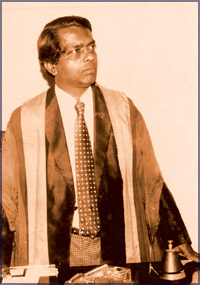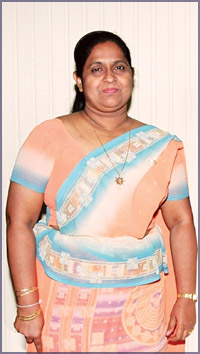|
Human Rights Commission of Sri Lanka |
Compiled by Sarath MALALASEKERA |
Declining trend in Human Rights violations
Mahanama TILLAKARATNE, HRCSL Commissioner
There are two government authorised legally constituted institutions,
in the country to look into human rights violations; One is the Human
Rights Commission, and the other, Presidential Commission of Inquiry
regarding abductions, disappearances, unexplained assaults on Civilians
resulting in deaths, and unidentified dead bodies.
The Human Rights Commission is empowered to investigate allegations
of infringement of human rights, ex mero motu or on complaints made by
affected or interested persons.
|

Mahanama Tillakaratne |
Though certain elements vigorously complain and criticize the
Constitutionality of the Commission, allegedly for want of proper
appointments, yet to avoid lawlessness, anarchy and rule of the wild
ass, Parliament in its wisdom had made provision for appointment of
members of the Commission by His Excellency the President, in the manner
provided for by the Act. If the dispute over appointments to the
Constitutional council is solved, the problem if any, will cease to
exist for which the Commission cannot be blamed.
Section 3 (2) of Act 21 of 1996 states “The members of the Commission
shall be appointed by the President, on the recommendation of the
Constitutional Council.
Provided however, that during the period commencing on the appointed
date and ending on the date when the Constitutional Council is
established members of the Commission shall be appointed by the
President on the recommendation of the Prime Minister in consultation
with the Speaker and the leader of the Opposition.”
Section 10 of the Act stipulates the functions of the Commission,
which include power to inquiry into the investigate complaints regarding
procedures to ensure compliance with the provisions of the Constitution
relating to fundamental rights, and to promote respect for and
observance of fundamental rights.
Most important of the powers vested in the Commission are to inquire
into and investigate complaints regarding infringements or imminent
infringements of fundamental rights, and to resolve them by conciliation
and mediation.
Section 10 (a)(b)(c) are concerned with fundamental rights, whilst
(d)(e) and (f) deal with functions relating to human rights.
Section 33, the interpretation clause defines the fundamental rights
as those declared and recognized by the Constitution and human rights
mean a right declared and recognized by the International Covenant on
Civil and Political Rights and the International Covenant on Economic,
Social and Cultural Rights.
There are about thirty-five International Treaties relating to Human
Rights and Humanitarian Law;
Human Rights Law and Humanitarian Law are branches of International
law, and differs from National law, which is constituted of branches
like, Criminal Law, Law of Property, Contracts etc. Human Rights law and
humanitarian law developed largely since World War II.
Thomas Buergenthal in International Human Rights in a nutshell (St.
Paul, M.N. West Publishing Co. 1988) P.1 defined Human Rights law as,
“the law which deals with the protection of individuals and groups
against violations by government of their internationally guaranteed
rights, and with the promotion of these rights”.
It is apparent from this definition that human rights law to become a
part or branch of local law, has to be incorporated into the local law,
because they only constitute internationally guaranteed rights, and
above all, to protect persons from the acts of the governments which
result in violations of such rights.
One has to bear in mind that our Supreme Court is the guardian of
fundamental rights enshrined in the Constitution, which is the Supreme
law of the land. So fundamentally, in case of breach, it is the
Government of the particular country that is blamed, and the attack is
on the Government.
Infringement of fundamental rights and the human rights had been of
frequent occurrence even in a small way since the ancient times, and of
much significance during 1971 insurrection, 1983 communal disturbances
period, and 1988-1989 second insurrection.
The human rights activists mostly foreign funded NGOs and their
agents and persons with different agendas, and many foreign countries,
despite occurrence of violations in their own country almost daily, have
been activated to find fault with the real protectors of such rights
like the Commission, and aimed at devastating the image of the country,
by baseless and flimsy allegations.
Human Rights operate only during peace-time, because a Government is
occupied with the paramount task of securing the independence and the
national security of the State, rather than protecting human rights of
individuals.
Even the fundamental rights have restrictions prescribed by the
Constitution itself, Article 15(1) stipulates that the rights declared
by Articles 13 (5) and 13 (6) shall be subject to such restrictions as
may be prescribed by law in the interests of national security. In the
recent past so many organizations engaged in the human rights field,
used a ramshackled band wagon exalting and expanding violations
occurring in a large magnitude, and the data statistics and figures
shown by them are beyond reality.
Inquiries by the Presidential Commission of Inquiry reveal that,
these figures and details were the impressions of the complaints and
nearly 90 per cent of the disappeared persons in the other areas like
Anurdhapura, Polonnaruwa, Kalutara and Colombo Districts have left home
temporarily over personal reasons or family disputes and have been found
or returned.
Even in Jaffna there were instances, where the son or husband being
scolded by home people for excessive drinks, leaving the house and
returning after a few days, or the husband eloped with the sister-in-law
and admitting at the Police station of their guilt; Human Rights
Commission in 2006 received 7617 complaints of violations like torture,
transfer, promotional disputes, recruitment, interdictions, retirement,
extensions, Termination, Pension, school admissions etc.
Only 5005 were found to be within the Mandate, and thus 1720 were
ruled out. 892 were awaiting further information from petitioners.
Majority of inquiries were concluded.
Statistics available indicate a sharp drop in complaints, and the
present Commission has taken steps to expedite inquiries, and to
overrule at the point of institution itself the complaints not within
the Mandate, and to direct parties to proper places or forums for
relief.
The Commission inquiring into abductions, disappearances etc. has a
totally different picture in contrast. There, full-scale inquiries
reveal that except a very few, 90% of the disappeared have come back.
These figures show the reality and the exaggerated figures from
dustbins only taint the image of the land.
The applications are thoroughly scanned by three Senior lawyers,
constituting a panel, and directed to investigating officers and
inquirers for inquiry, and a new methodology is adopted to dispose of
the matter within three months.
Torture cases from 01.01.2005 to 30.07.2005 were 366, and arrest and
detention only 204.
Torture from 01.01.2006 to 30.07.2005 were 345, and arrest and
detention only 289
Torture from 01.01.2007 - 30.07.2007 were 304 and arrest and
detention 329.
Out of these 54 torture complaints and 116 arrest and detention cases
were finally disposed; these were during the period of 01.01.2007 -
30.07.2007. Occasional Police visits by officers contribution to the
decline in torture.
In the year 2006, the Economic, Social Environmental matters referred
to, were the highest 1271, and steps not taken by petitioners totalled
499. Once a matter is entertained it is for the petitioner to pursue and
co-operate to end the issue.
Even the prescriptive period has been restricted to 3 months; earlier
all applications irrespective of the Mandate and time element, were
entertained, thereby creating a backlog, and the old cases are
expeditiously attended to, under the new scheme. There were pure civil
matters entertained indiscriminately, and time wasted on them.
The irony is, thus who were num, during flagrant infringements
referred to above, are now on the bandwagon.
It is always the affected aggrieved party who comes before both
Commissions seeking relief and redress, and the organizations are
destructively critical of the activities.
Those who leave the country for better postures, persons in hiding,
leaving residence on personal grounds could never be identified as
‘disappeared’ under the warrants and Mandate.
Thus in reality they are there, and the statistics are always
available in the truth, and the Commissions assert despite in few
instances, all those alleged disappeared are alive, and investigations
commenced regarding actualities.
The regional centres of the Commission at Jaffna, Kalmunai, Batticaloa, Vavuniya
and Trincomalee had received complaints of abductions and disappearances in the months
from January 2007 to July 2007 as follows:
Jaffna - 201 - offenders unknown
42 - by L.T.T.E.
Kalmunai - 13 - Offenders unknown
7 by L.T.T.E.
10 - by Karuna Group
Batticaloa - 63 - by unknown persons
21 - by Karuna Group
9 - by L.T.T.E.
Vavuniya - 82 - by unknown persons
22 - by Karuna Group
Trincomalee - 06 - L.T.T.E
29 - by unknown persons
04 - by Karuna Group
(The writer is a former High Court Judge)
International Children’s Day celebration 2007
Thilani RAJAPAKSE
‘Today the children are insecure in the society. There was no need of
special protection to children in my childhood,’ said Justice D.
Jayawickrama, retired judge of Court of Appeal and the Commissioner of
Human Rights Commission of Sri Lanka addressing the “International
Children’s Day” celebration organised by the HRCSL for the Principals
and Deputy principals of Homagama Education Zone. He further stated that
human rights are concepts which were in our ancestral societies and it
is
|

Thilani Rajapakse |
not a western concept.
This celebration was organised by the Monitoring and Review Division
of the HRCSL with the assistance of Ms. Chitrangani Lunuvila, Zonal
Director of Education, Homagama. There were about sixty participants
including Principals, Deputy Principals and Heads of Disciplinary
Committees of schools from the schools of Education Zone of Homagama.
Several cultural events were presented by the students of Homagama
Central College and Homagama Maha Vidyalaya.
The guests of the programme were Mr. Mahanama Thilakaratne, retired
Judge of High Court, Commissioner of HRCSL, Mrs. Indrani Sugathadasa,
Secretary of Ministry of Child Development and Women’s Empowerment, Mr.
Jagath Wellawatte, Chairman of National Child Protection Authority, Mr.
Anton Sirikumara, ASP-Homagama South.
Mrs. Thilani Rajapakse, Attorney-at-Law, Director, Monitoring and
Review Division, Human Rights Commission of Sri Lanka explained the
objectives of the programme.
She explained that according to the section 10(f) of the Human Rights
Commission Act the functions of the Commission shall be to promote
awareness of, and provide education in relation to, human rights.
She further mentioned that for the purpose of discharging its
functions the Commission undertakes research into, and promote awareness
of, human rights, by conducting programs, seminars workshops in
accordance with the section 11(f) of the said Act. Summary of the
objectives are as follows:
* To provide awareness on human rights and child rights.
* To protect and safeguard the rights of the students.
* To discuss how to protect child rights within the role of teachers.
* To create an official support system for child rights violations
and to take necessary steps to minimize them.
* To receive complaints regarding human rights violations and
referring them to the relevant institutions for necessary action.
* To create a mechanism to organise seminars, lectures and workshops
for school students to educate them on protection and promotion of human
rights.
Main lecture of the programme was delivered by Mr. Nimal Punchihewa,
Additional Secretary of the Human Rights Commission. The theme of his
lecture was “how to protect child rights within the role of the
teachers.” He explained the gathering about building relationships with
the students to create a human rights respected future society.
He pointed out that a situation has been created where our young
generation today is not giving right respect to teachers, parents etc.
he said. He emphasized that corporal punishment should be eradicated
from schools as we can’t build good citizens by punishments.
He further mentioned that the teachers must work as real
professionals and should be an example to the society.
(The writer is Director Monitoring and Review, Human Rights
Commission of Sri Lanka) |

